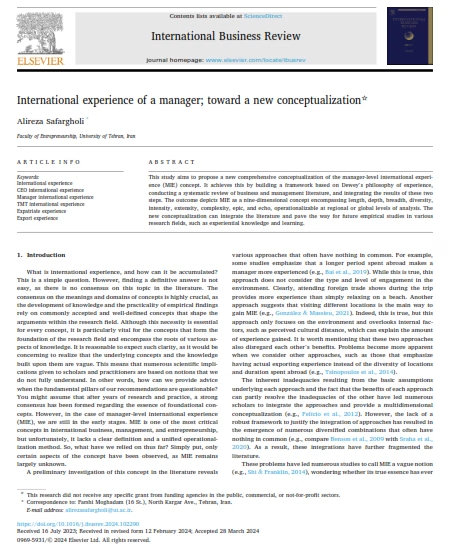
International Experience of a Manager; Toward a New Conceptualization
International Business Review, Volume 33, Issue 4
What this article is about:
Although firm-level international experience (IE) has received considerable attention, the literature still lacks comprehensive and unified conceptualizations of this concept. To address this need, the author sets out to use Dewey’s philosophy to define IE, conduct a review of 306 high-quality articles published in business, management, and entrepreneurship literature to gather existing perspectives on the concept, and combine these insights to propose a fresh and integrated conceptualization.
Through this process, the article establishes the idea that situations act as sources of experience, highlighting that previous studies have mainly concentrated on selected facets of IE while neglecting a more holistic understanding of the phenomenon. Building on these findings, the study introduces a new conceptualization of IE, presenting it as a seven-dimensional construct composed of length, breadth, depth, intensity, diversity, complexity, and echo. Each dimension represents a distinct but interconnected element necessary for a complete understanding of international experience at the firm level.
In addition, the article explains that IE can be assessed across six distinct levels, which are determined by the nature of its origin—whether entry mode specific, international marketing specific, or a combination of both—and by the geographical scope, either regional or global. By offering this multi-layered perspective, the study enriches the current understanding and creates a more structured basis for future exploration.
The findings from this research contribute significantly to the academic and managerial fields by establishing a strong foundation for further investigation into certain fields such as business strategy, marketing management, entrepreneurship, experiential knowledge, and learning. Overall, the proposed conceptualization provides researchers and practitioners with a comprehensive tool for better analyzing, interpreting, and applying the concept of firm-level international experience in diverse contexts.

Decades of research on international performance of SMEs; where are we and what are the priorities for the next decade?
International Marketing Review, Volume 41, No. 6
What this article is about:
Small and medium-sized enterprises (SMEs) design specific strategies to improve all aspects of their international performance (IP), primarily because of their constrained resources in domestic or global markets. Nevertheless, the literature has not consistently addressed each critical dimension and has left several areas insufficiently explored. In addition, the use of various approaches to measure SME IP has contributed to an even greater fragmentation of the academic landscape. This research aims to identify the existing gaps in both the research contexts and assessment methods related to this concept. By identifying six distinct contexts in which SME IP has been studied, the study connects major research themes to specific geographical domains and highlights areas where further scholarly attention is needed.
Furthermore, this investigation provides an extensive review of current practices regarding the operationalization of the concept, shedding light on the degree of fragmentation and methodological inconsistency present in the business, management, and entrepreneurship literature. Through a detailed mapping of the current body of work, this study not only highlights the scattered nature of existing research but also provides clarity on the specific elements that demand refinement and deeper examination. Following the establishment of a comprehensive and enriched research agenda, the study aims to guide scholars toward the most critical gaps and unmet needs across various contexts and geographic regions.
Additionally, it suggests pathways for developing a more integrated and cohesive framework for assessing the international performance of SMEs. By doing so, it aims to foster greater consistency and comparability in future studies. Overall, this research contributes significantly to various business and management areas such as marketing and strategy by pinpointing neglected areas, offering structured recommendations for addressing them, and supporting the evolution of a more unified and systematic approach to understanding SME international performance.

Firm International Experience in Global Markets: A Systematic Literature Review and Reconceptualization
Journal of International Marketing, Volume 31, Issue 3
What this article is about:
Although firm-level international experience (IE) has received considerable attention, the literature still lacks comprehensive and unified conceptualizations of this concept. To address this need, the author sets out to use Dewey’s philosophy to define IE, conduct a review of 306 high-quality articles published in business, management, and entrepreneurship literature to gather existing perspectives on the concept, and combine these insights to propose a fresh and integrated conceptualization.
Through this process, the article establishes the idea that situations act as sources of experience, highlighting that previous studies have mainly concentrated on selected facets of IE while neglecting a more holistic understanding of the phenomenon. Building on these findings, the study introduces a new conceptualization of IE, presenting it as a seven-dimensional construct composed of length, breadth, depth, intensity, diversity, complexity, and echo. Each dimension represents a distinct but interconnected element necessary for a complete understanding of international experience at the firm level.
In addition, the article explains that IE can be assessed across six distinct levels, which are determined by the nature of its origin—whether entry mode specific, international marketing specific, or a combination of both—and by the geographical scope, either regional or global. By offering this multi-layered perspective, the study enriches the current understanding and creates a more structured basis for future exploration.
The findings from this research contribute significantly to the academic and managerial fields by establishing a strong foundation for further investigation into certain fields such as business strategy, marketing management, entrepreneurship, experiential knowledge, and learning. Overall, the proposed conceptualization provides researchers and practitioners with a comprehensive tool for better analyzing, interpreting, and applying the concept of firm-level international experience in diverse contexts.
© 2026 All Rights Reserved.